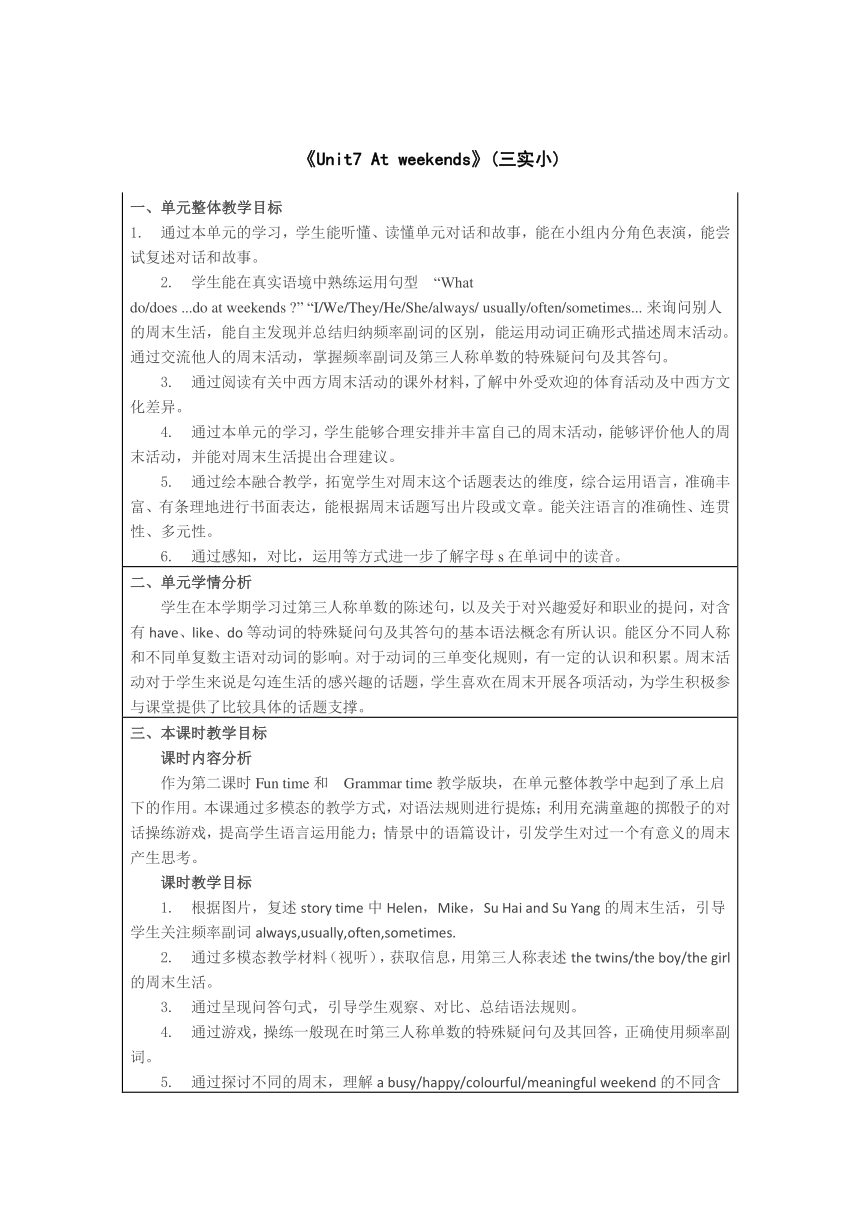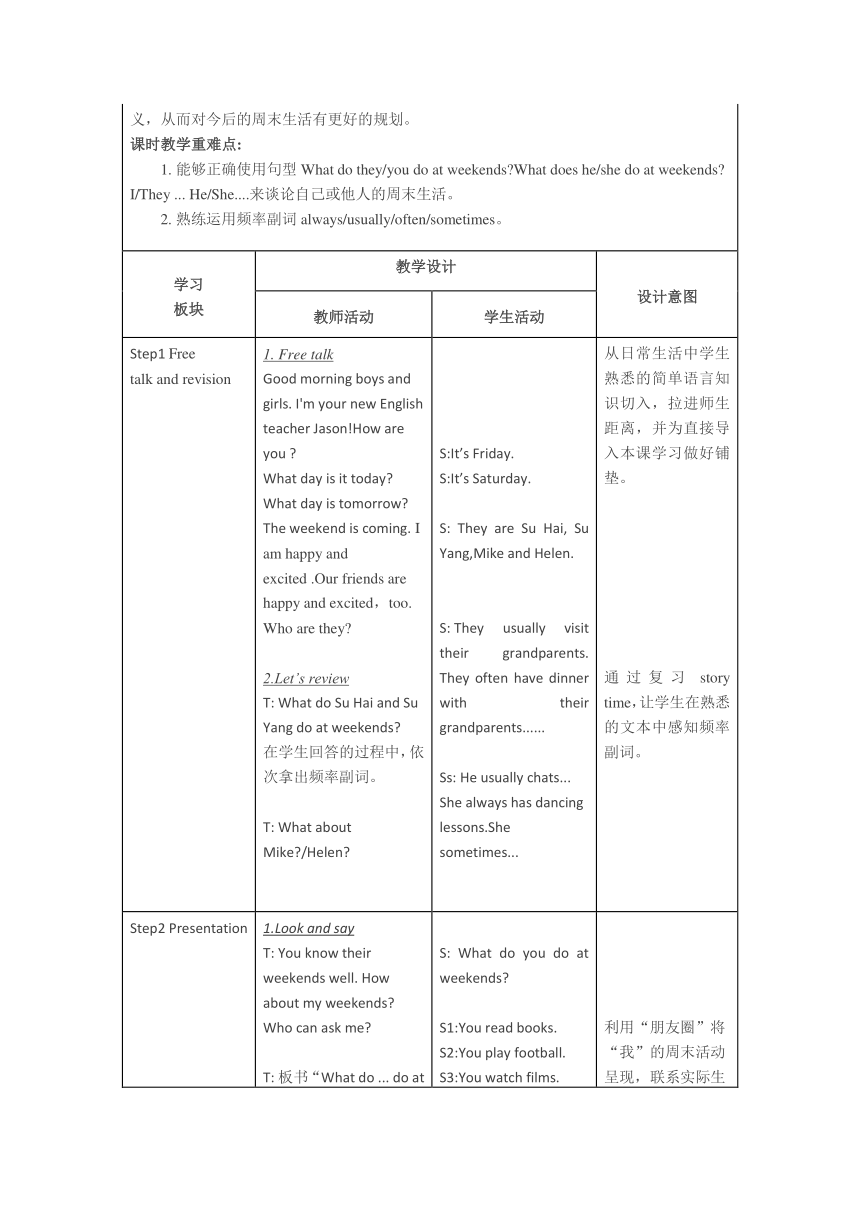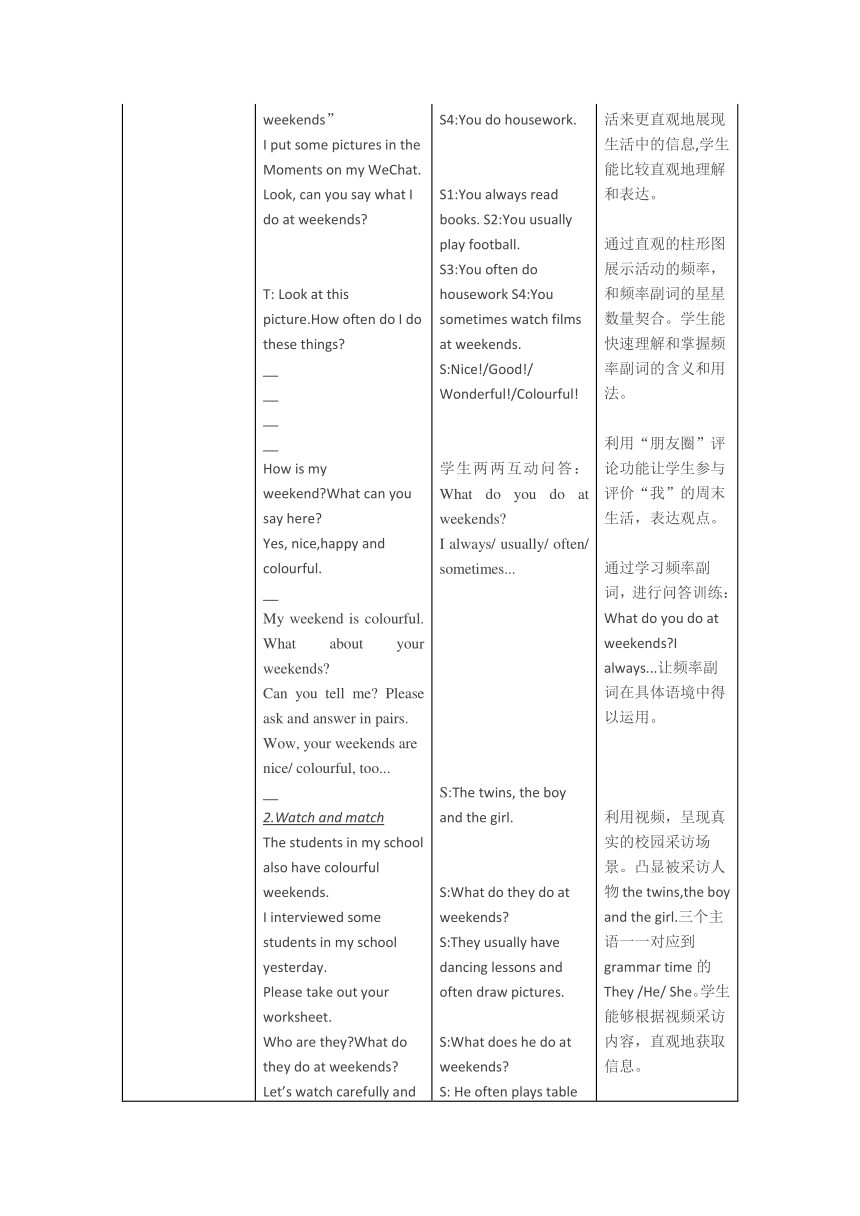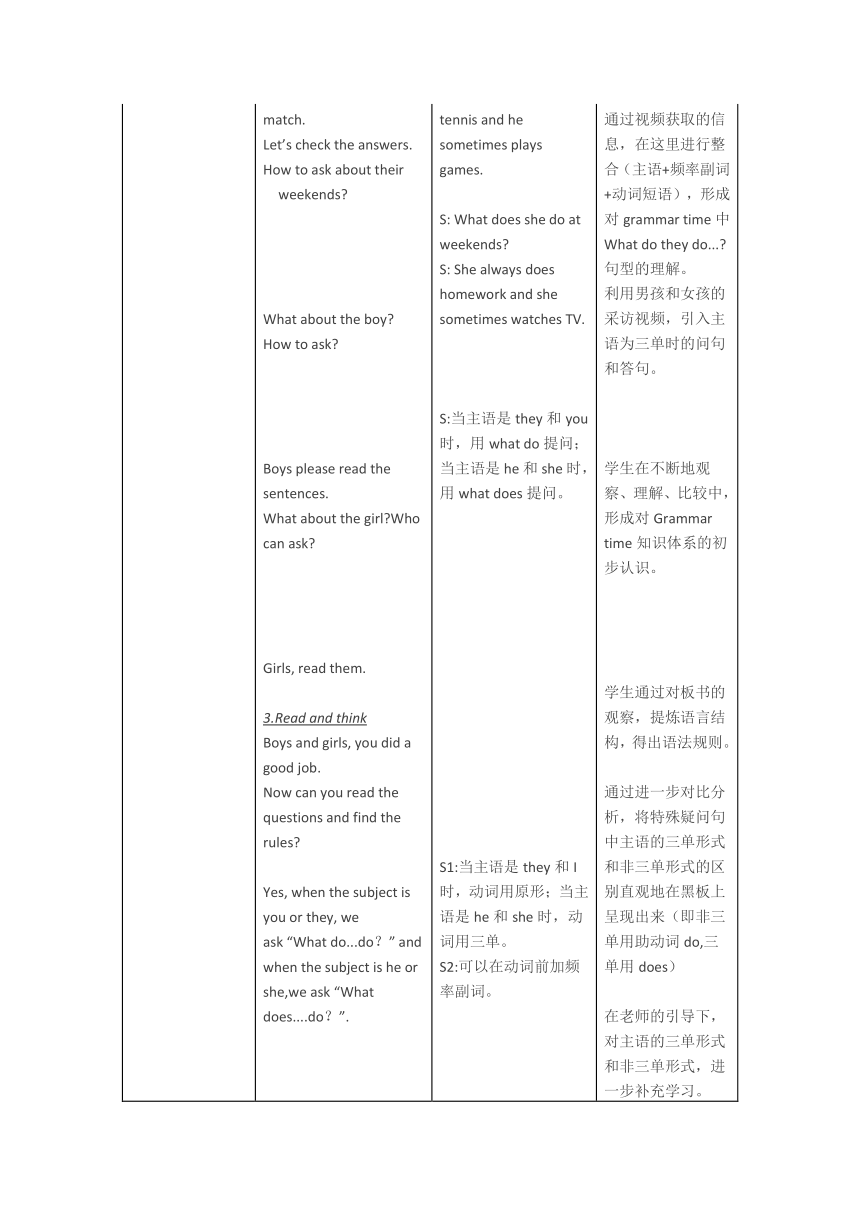Unit 7 At weekends 表格式教案
文档属性
| 名称 | Unit 7 At weekends 表格式教案 |

|
|
| 格式 | docx | ||
| 文件大小 | 29.2KB | ||
| 资源类型 | 教案 | ||
| 版本资源 | 牛津译林版 | ||
| 科目 | 英语 | ||
| 更新时间 | 2024-06-26 00:00:00 | ||
图片预览




文档简介
《Unit7 At weekends》(三实小)
一、单元整体教学目标 1. 通过本单元的学习,学生能听懂、读懂单元对话和故事,能在小组内分角色表演,能尝试复述对话和故事。 2. 学生能在真实语境中熟练运用句型 “What do/does ...do at weekends ” “I/We/They/He/She/always/ usually/often/sometimes... 来询问别人的周末生活,能自主发现并总结归纳频率副词的区别,能运用动词正确形式描述周末活动。通过交流他人的周末活动,掌握频率副词及第三人称单数的特殊疑问句及其答句。 3. 通过阅读有关中西方周末活动的课外材料,了解中外受欢迎的体育活动及中西方文化差异。 4. 通过本单元的学习,学生能够合理安排并丰富自己的周末活动,能够评价他人的周末活动,并能对周末生活提出合理建议。 5. 通过绘本融合教学,拓宽学生对周末这个话题表达的维度,综合运用语言,准确丰富、有条理地进行书面表达,能根据周末话题写出片段或文章。能关注语言的准确性、连贯性、多元性。 6. 通过感知,对比,运用等方式进一步了解字母s在单词中的读音。
二、单元学情分析 学生在本学期学习过第三人称单数的陈述句,以及关于对兴趣爱好和职业的提问,对含有have、like、do等动词的特殊疑问句及其答句的基本语法概念有所认识。能区分不同人称和不同单复数主语对动词的影响。对于动词的三单变化规则,有一定的认识和积累。周末活动对于学生来说是勾连生活的感兴趣的话题,学生喜欢在周末开展各项活动,为学生积极参与课堂提供了比较具体的话题支撑。
三、本课时教学目标 课时内容分析 作为第二课时Fun time和 Grammar time教学版块,在单元整体教学中起到了承上启下的作用。本课通过多模态的教学方式,对语法规则进行提炼;利用充满童趣的掷骰子的对话操练游戏,提高学生语言运用能力;情景中的语篇设计,引发学生对过一个有意义的周末产生思考。 课时教学目标 1. 根据图片,复述story time中Helen,Mike,Su Hai and Su Yang的周末生活,引导学生关注频率副词always,usually,often,sometimes. 2. 通过多模态教学材料(视听),获取信息,用第三人称表述the twins/the boy/the girl的周末生活。 3. 通过呈现问答句式,引导学生观察、对比、总结语法规则。 4. 通过游戏,操练一般现在时第三人称单数的特殊疑问句及其回答,正确使用频率副词。 5. 通过探讨不同的周末,理解a busy/happy/colourful/meaningful weekend的不同含义,从而对今后的周末生活有更好的规划。 课时教学重难点: 1. 能够正确使用句型What do they/you do at weekends What does he/she do at weekends I/They ... He/She....来谈论自己或他人的周末生活。 2. 熟练运用频率副词always/usually/often/sometimes。
学习 板块 教学设计 设计意图
教师活动 学生活动
Step1 Free talk and revision 1. Free talk Good morning boys and girls. I'm your new English teacher Jason!How are you What day is it today What day is tomorrow The weekend is coming. I am happy and excited .Our friends are happy and excited,too. Who are they 2.Let’s review T: What do Su Hai and Su Yang do at weekends 在学生回答的过程中,依次拿出频率副词。 T: What about Mike /Helen S:It’s Friday. S:It’s Saturday. S: They are Su Hai, Su Yang,Mike and Helen. S: They usually visit their grandparents. They often have dinner with their grandparents...... Ss: He usually chats... She always has dancing lessons.She sometimes... 从日常生活中学生熟悉的简单语言知识切入,拉进师生距离,并为直接导入本课学习做好铺垫。 通过复习story time,让学生在熟悉的文本中感知频率副词。
Step2 Presentation 1.Look and say T: You know their weekends well. How about my weekends Who can ask me T: 板书“What do ... do at weekends” I put some pictures in the Moments on my WeChat. Look, can you say what I do at weekends T: Look at this picture.How often do I do these things How is my weekend What can you say here Yes, nice,happy and colourful. My weekend is colourful. What about your weekends Can you tell me Please ask and answer in pairs. Wow, your weekends are nice/ colourful, too... 2.Watch and match The students in my school also have colourful weekends. I interviewed some students in my school yesterday. Please take out your worksheet. Who are they What do they do at weekends Let’s watch carefully and match. Let’s check the answers. How to ask about their weekends What about the boy How to ask Boys please read the sentences. What about the girl Who can ask Girls, read them. 3.Read and think Boys and girls, you did a good job. Now can you read the questions and find the rules Yes, when the subject is you or they, we ask “What do...do?” and when the subject is he or she,we ask “What does....do?”. What if the subject is “we” We also ask what do ..do And What about “the boys” or :Su Hai and Su Yang When the subject is the third person singular like it,Mike or the girl,we also ask what does...do Now read the answers by yourselves. What are the rules When the subject is I or they we use read and have. But when the subject is he or she we must add s or es. Don’t forget to use always ,usually, often or sometimes before the verbs. Sometimes we can put sometimes here.(答句规则体现三单变化和频率副词的位置) The verbs change when the subject is the third person singular.Do you know how to change Look at the words.Who can try What are the rules Now you know the grammar rules. But can you use them well Let’s play a game to check. S: What do you do at weekends S1:You read books. S2:You play football. S3:You watch films. S4:You do housework. S1:You always read books. S2:You usually play football. S3:You often do housework S4:You sometimes watch films at weekends. S:Nice!/Good!/ Wonderful!/Colourful! 学生两两互动问答:What do you do at weekends I always/ usually/ often/ sometimes... S:The twins, the boy and the girl. S:What do they do at weekends S:They usually have dancing lessons and often draw pictures. S:What does he do at weekends S: He often plays table tennis and he sometimes plays games. S: What does she do at weekends S: She always does homework and she sometimes watches TV. S:当主语是they和you时,用what do提问;当主语是he和she时,用what does提问。 S1:当主语是they和I时,动词用原形;当主语是he和she时,动词用三单。 S2:可以在动词前加频率副词。 S:动词第三人称单数的形式规则1.直接加s2.以x/sh/s/ch/o结尾的加es3.辅音加y结尾的动词去y加ies4.have的动词三单是has。 利用“朋友圈”将“我”的周末活动呈现,联系实际生活来更直观地展现生活中的信息,学生能比较直观地理解和表达。 通过直观的柱形图展示活动的频率,和频率副词的星星数量契合。学生能快速理解和掌握频率副词的含义和用法。 利用“朋友圈”评论功能让学生参与评价“我”的周末生活,表达观点。 通过学习频率副词,进行问答训练:What do you do at weekends I always...让频率副词在具体语境中得以运用。 利用视频,呈现真实的校园采访场景。凸显被采访人物the twins,the boy and the girl.三个主语一一对应到grammar time的They /He/ She。学生能够根据视频采访内容,直观地获取信息。 通过视频获取的信息,在这里进行整合(主语+频率副词+动词短语),形成对grammar time中What do they do... 句型的理解。 利用男孩和女孩的采访视频,引入主语为三单时的问句和答句。 学生在不断地观察、理解、比较中,形成对Grammar time知识体系的初步认识。 学生通过对板书的观察,提炼语言结构,得出语法规则。 通过进一步对比分析,将特殊疑问句中主语的三单形式和非三单形式的区别直观地在黑板上呈现出来(即非三单用助动词do,三单用does) 在老师的引导下,对主语的三单形式和非三单形式,进一步补充学习。 学生对答句进行归纳,通过对问句规律的理解,答句的规则也能比较容易找到。 经过动词三单形式变化的练习,归纳出不同三单形式动词的变化规则,学生进一步巩固理解。 语法知识是“形式—意义—使用”的统一体,直接影响语言理解与表达的正确性。掌握了一般现在时的语法规则,才能更好地进行实践运用。
Step3 Activity 1.Let’s play Take out your game map. They are Lily’s and Tom’s weekends. Let’s watch a video and learn about the rules. 播放视频,了解游戏规则。 Now I am here. Who wants to play with me The number is 6. 1,2,3,Do I get to finish No, what can I do I must go back 4,5,6. Now the number is 3. 提问 Oh you are wrong. My turn again. 1,2,3 Oh I win! 3 minutes for you. Take out your game map and play. Time is up. Did you have fun Who are the winners Here are picture books for you. 在学习与理解的基础上,引导学生基于所形成的结构化知识,开展问答等语言实践活动,巩固结构化知识,促进知识向能力的转化。
Step4 Thinking 1.Fill in the blanks Wow boys and girls. We can do many things at weekends. And look at Tom’s Moments on WeChat. Can you look at the pictures and fill in the blanks What does Tom mainly do at weekends How is his weekend What about Lily’s weekends? What does she mainly do at weekends How is her weekend 2.Further thinking Look. This is my student’s Moment. What do he and his friends do at weekends How are their weekends Boys and girls,you have colourful,busy and happy weekends. I hope you can have more meaningful weekends. Then you will get more happiness. S:He does sports. S:Happy. S:She learns. S:Busy. S:They visit old people and help old people. S: Happy , meaningful 根据学生的认知特点,让学生在朋友圈这种有趣的语篇支撑下,理解文本,操练句型。同时达到“能够讨论并初步评价别人的周末生活”这个目标,形成自己的个人情感和观点,从而感受到学习英语的乐趣,加深对主题意义的理解。 立德树人是英语教学的根本目的,引导学生在学习和应用英语的过程中,树立正确的人生观和价值观。
Homework(课后作业): Must do: 4人一组,1人进行采访其余三人。完成表格。最后采访者进行汇报。 Choose to do: Share your weekend pictures in your Moments on WeChat. Give comments to each other. 在朋友圈分享你的周末图片!并互相评论吧!
课后作业 Must do: 4人一组,1人进行采访其余三人。完成表格。最后采访者进行汇报。 Choose to do: Share your weekend pictures in your moments on Wechat. Give comments to each other. 在朋友圈分享你的周末图片!并互相评论吧!
一、单元整体教学目标 1. 通过本单元的学习,学生能听懂、读懂单元对话和故事,能在小组内分角色表演,能尝试复述对话和故事。 2. 学生能在真实语境中熟练运用句型 “What do/does ...do at weekends ” “I/We/They/He/She/always/ usually/often/sometimes... 来询问别人的周末生活,能自主发现并总结归纳频率副词的区别,能运用动词正确形式描述周末活动。通过交流他人的周末活动,掌握频率副词及第三人称单数的特殊疑问句及其答句。 3. 通过阅读有关中西方周末活动的课外材料,了解中外受欢迎的体育活动及中西方文化差异。 4. 通过本单元的学习,学生能够合理安排并丰富自己的周末活动,能够评价他人的周末活动,并能对周末生活提出合理建议。 5. 通过绘本融合教学,拓宽学生对周末这个话题表达的维度,综合运用语言,准确丰富、有条理地进行书面表达,能根据周末话题写出片段或文章。能关注语言的准确性、连贯性、多元性。 6. 通过感知,对比,运用等方式进一步了解字母s在单词中的读音。
二、单元学情分析 学生在本学期学习过第三人称单数的陈述句,以及关于对兴趣爱好和职业的提问,对含有have、like、do等动词的特殊疑问句及其答句的基本语法概念有所认识。能区分不同人称和不同单复数主语对动词的影响。对于动词的三单变化规则,有一定的认识和积累。周末活动对于学生来说是勾连生活的感兴趣的话题,学生喜欢在周末开展各项活动,为学生积极参与课堂提供了比较具体的话题支撑。
三、本课时教学目标 课时内容分析 作为第二课时Fun time和 Grammar time教学版块,在单元整体教学中起到了承上启下的作用。本课通过多模态的教学方式,对语法规则进行提炼;利用充满童趣的掷骰子的对话操练游戏,提高学生语言运用能力;情景中的语篇设计,引发学生对过一个有意义的周末产生思考。 课时教学目标 1. 根据图片,复述story time中Helen,Mike,Su Hai and Su Yang的周末生活,引导学生关注频率副词always,usually,often,sometimes. 2. 通过多模态教学材料(视听),获取信息,用第三人称表述the twins/the boy/the girl的周末生活。 3. 通过呈现问答句式,引导学生观察、对比、总结语法规则。 4. 通过游戏,操练一般现在时第三人称单数的特殊疑问句及其回答,正确使用频率副词。 5. 通过探讨不同的周末,理解a busy/happy/colourful/meaningful weekend的不同含义,从而对今后的周末生活有更好的规划。 课时教学重难点: 1. 能够正确使用句型What do they/you do at weekends What does he/she do at weekends I/They ... He/She....来谈论自己或他人的周末生活。 2. 熟练运用频率副词always/usually/often/sometimes。
学习 板块 教学设计 设计意图
教师活动 学生活动
Step1 Free talk and revision 1. Free talk Good morning boys and girls. I'm your new English teacher Jason!How are you What day is it today What day is tomorrow The weekend is coming. I am happy and excited .Our friends are happy and excited,too. Who are they 2.Let’s review T: What do Su Hai and Su Yang do at weekends 在学生回答的过程中,依次拿出频率副词。 T: What about Mike /Helen S:It’s Friday. S:It’s Saturday. S: They are Su Hai, Su Yang,Mike and Helen. S: They usually visit their grandparents. They often have dinner with their grandparents...... Ss: He usually chats... She always has dancing lessons.She sometimes... 从日常生活中学生熟悉的简单语言知识切入,拉进师生距离,并为直接导入本课学习做好铺垫。 通过复习story time,让学生在熟悉的文本中感知频率副词。
Step2 Presentation 1.Look and say T: You know their weekends well. How about my weekends Who can ask me T: 板书“What do ... do at weekends” I put some pictures in the Moments on my WeChat. Look, can you say what I do at weekends T: Look at this picture.How often do I do these things How is my weekend What can you say here Yes, nice,happy and colourful. My weekend is colourful. What about your weekends Can you tell me Please ask and answer in pairs. Wow, your weekends are nice/ colourful, too... 2.Watch and match The students in my school also have colourful weekends. I interviewed some students in my school yesterday. Please take out your worksheet. Who are they What do they do at weekends Let’s watch carefully and match. Let’s check the answers. How to ask about their weekends What about the boy How to ask Boys please read the sentences. What about the girl Who can ask Girls, read them. 3.Read and think Boys and girls, you did a good job. Now can you read the questions and find the rules Yes, when the subject is you or they, we ask “What do...do?” and when the subject is he or she,we ask “What does....do?”. What if the subject is “we” We also ask what do ..do And What about “the boys” or :Su Hai and Su Yang When the subject is the third person singular like it,Mike or the girl,we also ask what does...do Now read the answers by yourselves. What are the rules When the subject is I or they we use read and have. But when the subject is he or she we must add s or es. Don’t forget to use always ,usually, often or sometimes before the verbs. Sometimes we can put sometimes here.(答句规则体现三单变化和频率副词的位置) The verbs change when the subject is the third person singular.Do you know how to change Look at the words.Who can try What are the rules Now you know the grammar rules. But can you use them well Let’s play a game to check. S: What do you do at weekends S1:You read books. S2:You play football. S3:You watch films. S4:You do housework. S1:You always read books. S2:You usually play football. S3:You often do housework S4:You sometimes watch films at weekends. S:Nice!/Good!/ Wonderful!/Colourful! 学生两两互动问答:What do you do at weekends I always/ usually/ often/ sometimes... S:The twins, the boy and the girl. S:What do they do at weekends S:They usually have dancing lessons and often draw pictures. S:What does he do at weekends S: He often plays table tennis and he sometimes plays games. S: What does she do at weekends S: She always does homework and she sometimes watches TV. S:当主语是they和you时,用what do提问;当主语是he和she时,用what does提问。 S1:当主语是they和I时,动词用原形;当主语是he和she时,动词用三单。 S2:可以在动词前加频率副词。 S:动词第三人称单数的形式规则1.直接加s2.以x/sh/s/ch/o结尾的加es3.辅音加y结尾的动词去y加ies4.have的动词三单是has。 利用“朋友圈”将“我”的周末活动呈现,联系实际生活来更直观地展现生活中的信息,学生能比较直观地理解和表达。 通过直观的柱形图展示活动的频率,和频率副词的星星数量契合。学生能快速理解和掌握频率副词的含义和用法。 利用“朋友圈”评论功能让学生参与评价“我”的周末生活,表达观点。 通过学习频率副词,进行问答训练:What do you do at weekends I always...让频率副词在具体语境中得以运用。 利用视频,呈现真实的校园采访场景。凸显被采访人物the twins,the boy and the girl.三个主语一一对应到grammar time的They /He/ She。学生能够根据视频采访内容,直观地获取信息。 通过视频获取的信息,在这里进行整合(主语+频率副词+动词短语),形成对grammar time中What do they do... 句型的理解。 利用男孩和女孩的采访视频,引入主语为三单时的问句和答句。 学生在不断地观察、理解、比较中,形成对Grammar time知识体系的初步认识。 学生通过对板书的观察,提炼语言结构,得出语法规则。 通过进一步对比分析,将特殊疑问句中主语的三单形式和非三单形式的区别直观地在黑板上呈现出来(即非三单用助动词do,三单用does) 在老师的引导下,对主语的三单形式和非三单形式,进一步补充学习。 学生对答句进行归纳,通过对问句规律的理解,答句的规则也能比较容易找到。 经过动词三单形式变化的练习,归纳出不同三单形式动词的变化规则,学生进一步巩固理解。 语法知识是“形式—意义—使用”的统一体,直接影响语言理解与表达的正确性。掌握了一般现在时的语法规则,才能更好地进行实践运用。
Step3 Activity 1.Let’s play Take out your game map. They are Lily’s and Tom’s weekends. Let’s watch a video and learn about the rules. 播放视频,了解游戏规则。 Now I am here. Who wants to play with me The number is 6. 1,2,3,Do I get to finish No, what can I do I must go back 4,5,6. Now the number is 3. 提问 Oh you are wrong. My turn again. 1,2,3 Oh I win! 3 minutes for you. Take out your game map and play. Time is up. Did you have fun Who are the winners Here are picture books for you. 在学习与理解的基础上,引导学生基于所形成的结构化知识,开展问答等语言实践活动,巩固结构化知识,促进知识向能力的转化。
Step4 Thinking 1.Fill in the blanks Wow boys and girls. We can do many things at weekends. And look at Tom’s Moments on WeChat. Can you look at the pictures and fill in the blanks What does Tom mainly do at weekends How is his weekend What about Lily’s weekends? What does she mainly do at weekends How is her weekend 2.Further thinking Look. This is my student’s Moment. What do he and his friends do at weekends How are their weekends Boys and girls,you have colourful,busy and happy weekends. I hope you can have more meaningful weekends. Then you will get more happiness. S:He does sports. S:Happy. S:She learns. S:Busy. S:They visit old people and help old people. S: Happy , meaningful 根据学生的认知特点,让学生在朋友圈这种有趣的语篇支撑下,理解文本,操练句型。同时达到“能够讨论并初步评价别人的周末生活”这个目标,形成自己的个人情感和观点,从而感受到学习英语的乐趣,加深对主题意义的理解。 立德树人是英语教学的根本目的,引导学生在学习和应用英语的过程中,树立正确的人生观和价值观。
Homework(课后作业): Must do: 4人一组,1人进行采访其余三人。完成表格。最后采访者进行汇报。 Choose to do: Share your weekend pictures in your Moments on WeChat. Give comments to each other. 在朋友圈分享你的周末图片!并互相评论吧!
课后作业 Must do: 4人一组,1人进行采访其余三人。完成表格。最后采访者进行汇报。 Choose to do: Share your weekend pictures in your moments on Wechat. Give comments to each other. 在朋友圈分享你的周末图片!并互相评论吧!
